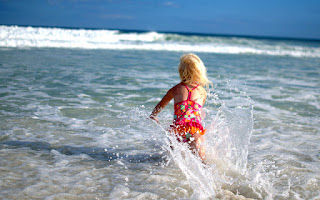Pediatricians
are prescribing a new kind of vitamin for children – vitamin N. There is a
reason for this. Sensory processing difficulties are on the rise in children. The
reasons could be varied, but there is one observable correlation people
associated with children have been noticing – as children are getting farther
and farther away from natural environments, sensory problems are increasing.
For kids with sensory problems, whose roots do not lie in the neurological or
physiological domain, an intense engagement with nature can have marvelous
benefits.
Fitting In
A fact
which most people seem to forget is this – humans for all their progress into
the digital age are still very firmly a part of the natural world. We are but a
jigsaw piece on this planet. Negotiating our way in this natural environment
should be instinctive, but we seem to be losing touch with these
instincts.
In the Past
Earlier
generations of children naturally spent a lot of time outdoors. While virtual pets rule the roost today,
real pets were more the norm some years ago. Most economies
were agriculture based. Children of all ages pitched in to help. Play involved
natural materials like trees, leaves, soil, water, seeds, cloth, leather etc.
Kids climbed trees, swung off branches, jumped into ponds, chased their
shadows, raced up grassy slopes, built sand castles, got muddy, ran in the rain,
made toys out of natural materials etc. They understood seasons, felt the
changes and used their senses to negotiate their way around their world. Lives
were attuned to nature. This helped build their physical abilities and
contributed to their emotional well-being.
In the Present
Even as
our lives are changing and we are becoming denizens of an increasingly digital
world, we must help our kids stay rooted in reality thereby helping them
maintain a certain elasticity in the functioning of their senses. For this sensory activities cannot be emphasized enough. Here are a few things we must ensure that
our kids explore in Nature:
1.
Soil
Get kids
to play with soil. Look at it, dig it, feel it, make shapes out of it, smell it
(before and after rain) and build with it. Kids love the wriggly creatures
which make soil their home. Ask them to observe these creature. Point out the
wonderful homes they build in soil. Show them pictures of how termite build
homes out of soil which are naturally air-conditioned. Ask them to spot things in different types of soil – pebbles, rocks,
sand etc. Ask kids to dig. Digging makes kids understand soil – the hardness,
layers and methods to soften it. The activity is good for their joints and
builds hunger. Filling holes with water and getting them to flow from one to
the other, will be like a model of water flows through lakes. Educational and a
great sensory activity. Dirt under fingertips might bother some parents, but
such activities do wonders for kids.
2.
Plant Life
Kids in
school inevitably grow seedlings in class while understanding germination.
Introduce them to trees which grow from tiny seeds. Open their eyes to the
wonder of nature. Babies are brought up by their adults. What about the young
of plants? Get kids to observe leaves, how some close and open, how some change
color, how they crumble in our hands when they are dry and how some leaves tear
easily while others are hard. Get kids to climb trees. You could start with low
branches and small trees. Get them to balance and jump off trees. Teach them to
bend their knees when they land. Swinging on branches, tying swings to
branches, plaiting pliable young branches, stitching leaf cups, harvesting
fruit – all these activities are simple and yet engage multiple senses.
3.
The World
around Us
Even in
2016 the fact remains that we do not know everything about our brains or for
that matter the world around us. Research studies in the army have shown that
kids who spent time outdoors trekking and spending time in woods hunting had
the best depth perception and peripheral vision. Spending time outdoors forces
our sense to expand and contract to accommodate our requirement, building in an
elasticity which is lost
It’s a
recorded fact that animals help children overcome challenges. Dogs have been used to calm kids with sensory
processing disorders. Association with dogs and other pets is always a plus for
kids (does not included kids who are allergic to dog hair)
As adults,
it’s our job to make sure that the younger generations are equipped to
negotiate this world. For this we as parents and caretakers need to be brave in
letting our young explore Nature. Kids might fall and hurt themselves, but most
will get up, brush off the dirt and be off to check out the next interesting
thing. The onus is on us. We have to lead them into the world that they will
one day inhabit without us. As Kahlil
Gibran said –
Your children are not your
children. They are the sons and daughters of Life's longing for itself.
